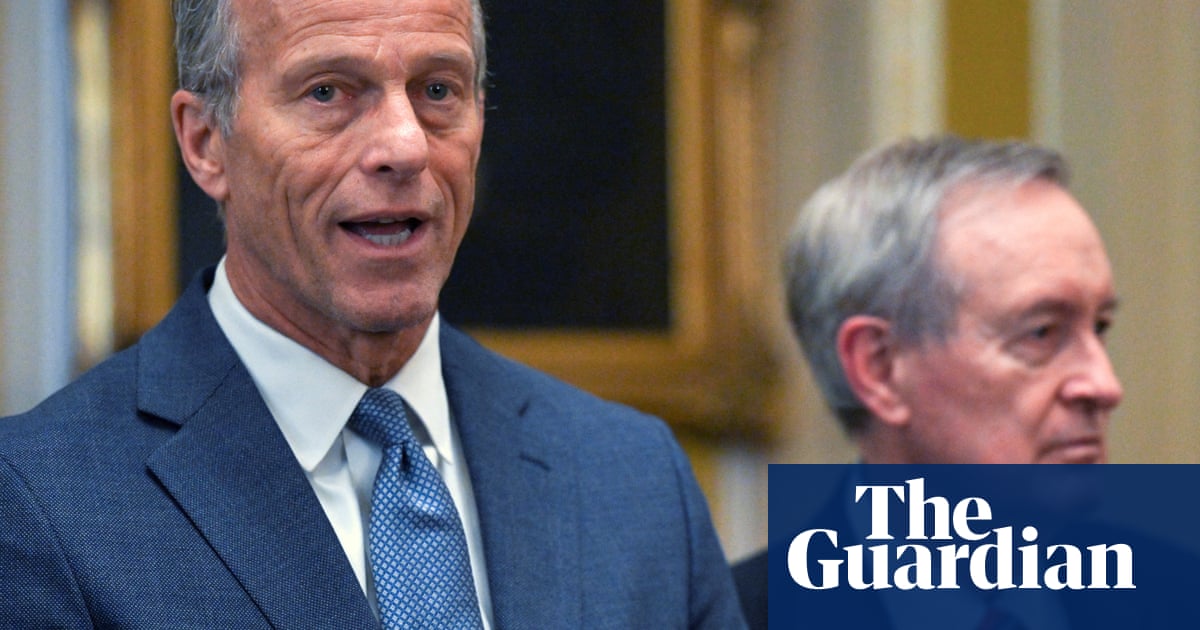When Donald Trump’s sweeping policy billarrived in the Senate in late May, its problems seemed unending.
It was Trump’s top legislative priority, and crafted in such a way that Democrats could not block it by using the filibuster. But it was greeted with skepticism by moderateRepublicans, who blanched at the bill’s cuts to two major safety net programs to offset expensive outlays elsewhere: tens of billions of dollars to fund mass deportations and build border walls, along with tax-cut extensions and new deductions that could increase the budget deficit by trillions of dollars over the coming decade.
Even conservatives like Missouri’s Josh Hawley were nervous about the bill’s targeting of Medicaid, the program that provides healthcare to poor and disabled Americans. He went to the New York Times and published anan op-edheadlined: “Don’t cut Medicaid”.
Yet just after noon on the first day of July, it became clear that the Senate’s Republican leaders had mollified those holdouts through a series of bargains struck right up until the final votes. The bill receivedjust enough supportfor passage, after JD Vance, the vice-president, came to the Senate chamber to break a tie.
“No bill of this size comes together without a lot of very hard work,” Republican Senate majority leader John Thune said following the vote. Left unsaid was the tumult that occurred on the road to getting there, and what it may cost Republicans in the future.
It started over the weekend, when Thune movedto open debateon the measure. Kentucky senator Rand Paul voted no, concerned about the bill’s impact to the budget deficit, which the nonpartisan Congressional Budget Office (CBO) estimated could total $3.3tn through 2034. Also objecting was moderate North Carolina senator Thom Tillis, which prompted an immediate attack from Trump, after which Tillis said hewould not seek re-electionnext year. Forecasters immediately saw the Republican defection as a boost for Democrats hoping to claim the purple state’s seat.
Hawley’s objections were couched in concerns that theworking-class voterswho backed Trump and other Republicans last November would desert the party if it pushed ahead with the cuts to Medicaid. The bill imposes new work requirements on enrollees, and also freezes or reduces the provider taxes that states have used to finance their Medicaid programs, which is feared to badly harm rural hospitals.
Senate leaders agreed to add a special fund to support rural hospitals that eventually grew to $50bn, as well as provisions to compensate nuclear radiation survivors that Hawley has long championed. Hawley voted for debate and passage of the bill, saying: “I will continue to do everything in my power to reverse future cuts to Medicaid. If Republicans want to be the party of the working class, we cannot cut health insurance for working people.”
Yet the bill would do just that – the CBO estimates that the number of uninsured people will climb by 11.8 million in 2034 because of the measure. And the new tax deduction would only last through Trump’s current term, while the provisions to extend cuts made during his first term – the most expensive part of the bill – are estimated tomostly benefit the rich.
Passage of the bill still came down to the wire. Susan Collins, the Maine Republican who is Democrats’ top target to unseat in next year’s midterms, voted to begin debate but could not be swayed when it came to final passage.
“My vote against this bill stems primarily from the harmful impact it will have on Medicaid,” she said after she voted no, alongside Paul, Tillis – who also objected to the Medicaid cuts – and all the Democrats.
In the final hours before the bill passed, the most sought-after vote was Lisa Murkowski’s, the Alaska moderate who was known for bucking her party, andplayed a partin torpedoing the GOP’s attempts to repeal the Affordable Care Act during Trump’s first term.
No such saga was to play out this time. Into the bill went provisions targeted specifically at her state, including an increase in tax deductions for Native Alaskan whalers. And while the bill will force most states to pick up some of the costs of the federal Supplemental Nutrition Assistance Program (Snap), a move expected to result in millions of people losing benefits they use to buy food, a provision was inserted to temporarily exempt states with high rates of over or underpayments – a group that includes Alaska.
It appeared to work – Murkowski voted for the bill.
“This was one of the hardest votes I have taken during my time in the Senate,” she latersaid in a statementthat went on to describe “an awful process”.
“My sincere hope is that this is not the final product. This bill needs more work across chambers and is not ready for the president’s desk,” she said. Yet that is where Trump wants the bill to be by Friday, the Independence Day holiday, and the House is now racing to pass the Senate’s version in time.
Democrats, meanwhile, could do little but watch and attempt to offer amendments that were mostly voted down. Minutes after its passage, Senate minority leader Chuck Schumer convened a press conference where he warned that Republicans would regret passing this bill.
“When their electric bills go up, when their premiums go up, when kids and parents lose Snap funding, the people of America will remember this vote,” he said.
